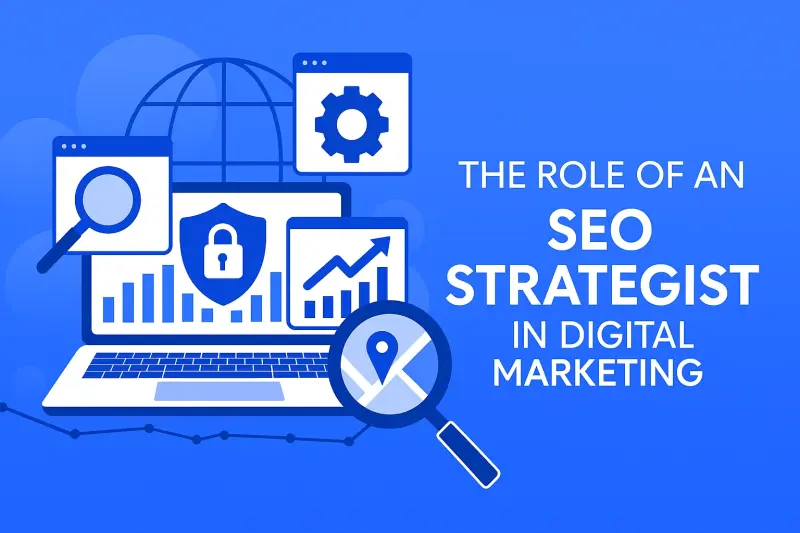Digital marketing can feel like a maze. Algorithms shift, competitors publish faster than ever, and customers expect answers instantly. Cutting through that noise requires direction, not guesswork, and that’s where an SEO strategist becomes irreplaceable. They translate search behaviour into clear actions, steady growth, and predictable visibility.
SEO strategists also help businesses understand where their opportunities are hiding and how to turn them into real traffic, real engagement, and real leads.
The role of an SEO strategist isn’t reserved for big companies or massive budgets. It’s becoming a must-have for businesses that want stability online, whether they’re updating old pages, building new content, or competing in a crowded local market.
In this digital marketing guide, we’re discussing what an SEO strategist handles day-to-day, how they work with marketing teams, and why their insights influence everything from technical fixes to content planning; the same approach our team uses at HeyTony to support long-term growth.
What Does an SEO Strategist Do?
A SEO strategist acts as the central guide for any business that wants consistent performance in organic search. They interpret data, outline priorities, and ensure that every update supports long-term visibility. When people ask us “What does an SEO strategist do?,” the answer is simple: SEO strategists connect search behaviour with business goals and give teams a roadmap to follow.
The day-to-day work of SEO strategists blends analysis, planning, and collaboration. They use research to understand how customers search, where competitors excel, and what must change on a website to support growth. Every SEO strategist recommendation is intentional, and every task aligns with a measurable outcome.
Many businesses underestimate how much strategy is required before any ranking improvements happen. A strong SEO strategist doesn’t start with keywords or content ideas. They start by figuring out what the business truly needs to grow. That means looking at revenue goals, customer behaviour, and historical analytics, then building a plan that lines up with real business outcomes. This is why strategy always wins over guesswork.
Reviewing Website Health Through Technical Audits (Speed, Mobile, Indexing)

Strong SEO begins with a complete technical review. Slow pages, indexing issues, mobile layout problems, and crawling errors all disrupt performance. During an audit, an SEO strategist digs into Core Web Vitals, tests page speed, checks site structure, and identifies issues that weaken visibility.
SEO insights form a prioritized roadmap that guides teams toward the most impactful updates. An SEO strategist explains what needs fixing, why it matters, and how each update impacts performance. Developers receive exact recommendations instead of general suggestions, keeping projects clear and efficient.
Building Keyword Plans That Match Real Search Intent
Keyword research tells a story about how customers think, what they want, and how close they are to converting. An SEO strategist studies search trends to identify the intent behind each keyword. Some terms signal early curiosity. Others point to users ready to compare solutions or request pricing.
By mapping specific keywords to service pages, blogs, and resource hubs, the SEO strategist ensures that search traffic aligns with business goals. The result isn’t random visibility; it’s targeted traffic that fits the company’s ideal audience.
Outlining Content Priorities for Pages, Blogs, and Resource Hubs
Content becomes significantly more powerful when it follows a clear plan. An SEO strategist evaluates all existing pages, identifies what needs improvement, and outlines what must be created next. High-impact pages get updated first. Supporting articles fill content gaps. Resource hubs build authority and showcase expertise.
These priorities take shape as monthly or quarterly content calendars. Instead of guessing what to publish, content teams follow a structured SEO plan backed by data and real user behaviour.
Understanding SEO Strategist Meaning in a Marketing Team

Understanding the role of SEO strategists within a full marketing team matters because it influences far more than search rankings. SEO strategists help other departments understand the value of search data. The SEO strategist uncovers how customers behave, what they look for, and which topics drive stronger engagement.
SEO strategists are the bridge between search results and business outcomes. Their insights guide the team’s messaging, content direction, and technical improvements.
Turning Search Trends Into Business Insights
Search trends change quickly. An SEO strategist reviews these shifts and translates them into ideas that support product updates, new service angles, and upcoming campaigns. They spot patterns before competitors do and share these findings so the business stays ahead.
With SEO strategists, marketing teams understand what customers are searching for today. This agility protects businesses from falling behind. A strategist who monitors trends in real time can adjust priorities before rankings drop or competitors take the lead. This proactive approach often creates opportunities that competitors don’t notice until it’s too late.
Aligning SEO Tasks With Sales, Goals, and Customer Journeys
Every SEO task should support a business priority. When the sales team focuses on a specific service or seasonal push, an SEO strategist adjusts content plans, landing pages, and keyword targets to support those goals.
Customer journeys matter too. A good SEO strategist recognizes whether users are researching, comparing, or ready to act, and guides them with pages built for each stage.
An effective SEO strategist also works closely with sales teams to identify objections customers bring up before buying. Those objections often become blog topics, FAQ sections, or comparison pages that help shorten the buying cycle. When content reflects real conversations sales teams are having daily, conversions rise dramatically.
Beyond that, SEO strategists help structure internal linking to guide visitors through the funnel in a logical way. Instead of hoping users find the right pages, the strategist intentionally shapes pathways that turn casual readers into educated buyers. This alignment between SEO and sales is often the difference between traffic that looks good on paper and traffic that actually generates revenue.
Identifying Competitor Strengths Using Real Search Data

Competitors reveal valuable clues. By studying ranking pages, backlink profiles, content depth, and SERP features, an SEO strategist identifies where competitors succeed and where they’re vulnerable. These insights guide the strategy, helping companies outperform rivals by producing more relevant, comprehensive content.
Competitor data also helps identify content formats that perform well in the industry. If top competitors rank with in-depth guides, visual walkthroughs, or side-by-side comparisons, the strategist takes note and improves on those formats. This allows your content to match user expectations while outperforming what’s already on the first page.
A strong strategist also looks deeper than keyword overlap. They examine tone, content structure, engagement signals, publishing frequency, and even how competitors present value. These insights help businesses craft content that not only outranks competitors but also resonates more authentically with users.
Why SEO Requires a Strategy Instead of Random Publishing
Publishing random content rarely works. Search engines prefer structured content ecosystems. An SEO strategist creates a long-term plan built around clusters, pillars, and clear user journeys. That structure helps pages rank faster and stay visible longer.
Random publishing also leads to duplicate efforts, wasted time, and content that competes with itself. A strategist prevents these problems by organizing topics into clear categories, ensuring each page plays a defined role in the website’s architecture. This keeps content clean, logical, and easy for both users and search engines to understand.
With a solid SEO strategy, every page strengthens the rest. Search engines see topical depth, internal consistency, and clear expertise, which are all major ranking factors. This long-term structure creates momentum that random content can never achieve.
How an SEO Strategist Improves Daily Website Performance
A website isn’t something you “optimize once” and forget. Performance depends on continuous improvements. The SEO strategist reviews analytics, monitors rankings, and evaluates user behaviour to keep the site competitive as search algorithms evolve.
SEO strategists also shape webpage marketing strategies that connect page layout, messaging, and calls-to-action with the search intent behind each visit. The day-to-day refinements of SEO create compounding gains that lead to long-term success.
Fixing On-Page Issues That Limit Visibility

On-page issues might look small, but they directly impact how search engines process a page. Missing metadata weakens visibility. Poor header structure makes topics unclear. Weak internal links disrupt the flow of authority across the site.
An SEO strategist catches these issues quickly and outlines exactly how they should be updated. With each improvement, the page becomes clearer, faster, and more accessible.
Updating High-Traffic Pages to Improve Conversions
High-traffic pages deserve special attention. When a page earns significant visibility but generates few conversions, something needs adjusting. Messaging, layout, or calls-to-action may not match what users expect.
An SEO strategist reviews heatmaps, scroll depth, and user paths to identify friction. Once updated, these pages often become some of the highest-performing assets on the site.
Using Analytics and SEO Tools to Measure Growth
Data reveals what’s working and where improvements are needed. At HeyTony, tools like Google Analytics, Search Console, Semrush, and Screaming Frog help confirm the impact of each update.
Rankings, impressions, user behaviour, and conversions highlight the patterns that matter most. With this information, SEO strategists refine priorities, adjust content or technical work, and keep the site moving in the right direction.
Partnering With an SEO Strategist for Better Results
When collaborating with an SEO content strategist, content production becomes more precise and more effective. An SEO strategist provides the structure, while the content strategist brings storytelling and clarity.
Together, they build content that satisfies search engines and users at the same time. This collaboration strengthens topical authority and makes content easier to scale.
Creating Strong Content Briefs for Service Pages

Service pages influence revenue, so briefs must be detailed. An SEO strategist outlines keywords, structure, questions the page should answer, and the user journey the content must support. Writers use these briefs to produce polished, optimized pages that connect with users and rank well.
Topic clusters show search engines that a business understands a subject deeply. They include pillar pages supported by detailed blogs, all internally linked. These clusters are built using research insights, making it easier for the site to compete in tougher niches.
Selecting Formats Like Case Studies, Tutorials, and FAQs
Different keywords demand different content formats. Case studies build trust. Tutorials guide users through tasks. FAQs address concerns. SEO strategists choose formats that support the intent behind each search.
How an SEO Strategist Team Works Together to Support Organic Growth
A strong SEO team works like a well-coordinated unit. The SEO strategist outlines the plan, writers produce content, designers enhance visual appeal, and developers implement technical improvements. When collaboration is smooth, websites grow faster and more consistently.
Developers Handling Technical Fixes for Core Web Vitals
Developers take the SEO recommendations and translate them into performance enhancements. Faster load times, responsive layouts, and reduced layout shifts all support better rankings and user experience.
Writers Producing Search-Aligned Content at Scale
Writers execute the content roadmap. They transform briefs into blogs, service pages, and resources that help the site rank more competitively.
Designers Enhancing Page Layouts For Improved Engagement

Design influences engagement. Pages with clear spacing, strong visual hierarchy, and easy navigation keep users around longer, sending positive signals to search engines.
When an SEO Strategist Consultant Makes Sense
Hiring an SEO consultant is often the right move when a business needs specialized support or temporary expertise. SEO consultants assist with complex projects, migrations, audits, or seasonal spikes in workload.
Projects That Need Deep Technical Expertise
Site migrations, international targeting, and complex indexing issues are best handled by seasoned experts. An SEO consultant brings advanced skills that ensure these projects run smoothly.
Times When In-House Marketers Need Support
When internal teams hit capacity, SEO consultants step in to manage content updates, audits, or technical improvements.
How to Evaluate an SEO Strategist Package Before Committing
Choosing an SEO package becomes easier when a business knows what to look for. Transparency, clear deliverables, and measurable outcomes are essential. Any package lacking these elements should raise red flags.
Deliverables That Include Audits, Monthly Content, and Backlinks
Quality SEO includes detailed audits, consistent content updates, backlink evaluation, and ongoing improvements.
Reporting That Includes Rankings, Traffic, and Conversions
Reports must show real results: rankings, traffic patterns, and lead generation. Anything less provides little value.
Clear KPIs Instead of Vague Promises
Strong KPIs define expectations. Businesses deserve clarity around conversions, organic growth, and keyword progress.
How SEO Leads Are Generated Through Organic Traffic

High visibility matters, but conversions matter more. When executed well, SEO becomes one of the strongest sources of SEO leads, giving businesses a steady funnel of qualified prospects.
Tracking Form Fills Using Analytics and CRM Tools
Quote forms, inquiries, and booking requests must be tracked accurately to understand which pages drive real results.
Monitoring Calls and Bookings From High-Performing Pages
Call tracking connects offline actions to online searches, giving a full picture of which pages influence conversions.
Measuring Keyword Paths That Drive Qualified Leads
Some keywords convert better than others. Mapping these paths helps SEO strategists focus on the most valuable opportunities.
Improve Your SEO Performance With HeyTony Today
Growth starts with clarity. If your business is ready to improve visibility, update key pages, or build a long-term plan for organic performance, contact us for digital marketing in Hamilton, Canada, and the US.
Our experienced digital marketing team builds precise, data-backed plans engineered to deliver results now and create sustained momentum that keeps pushing your business ahead.
Originally published . Last updated .
Categories:
Explore More



